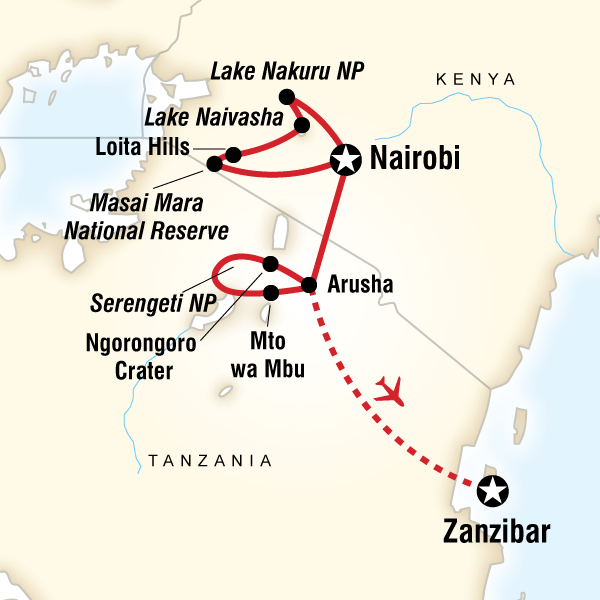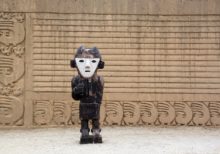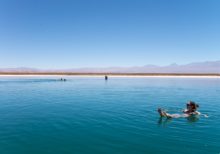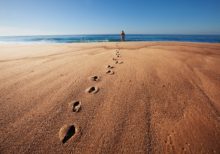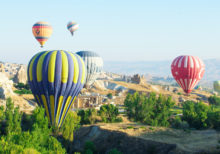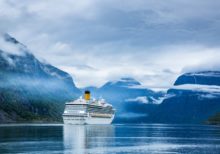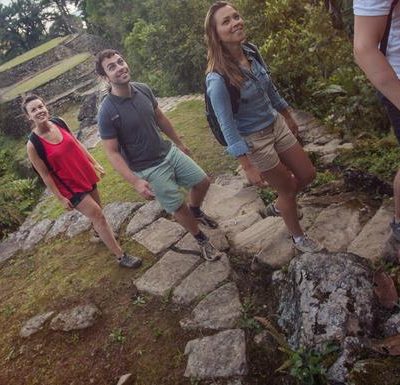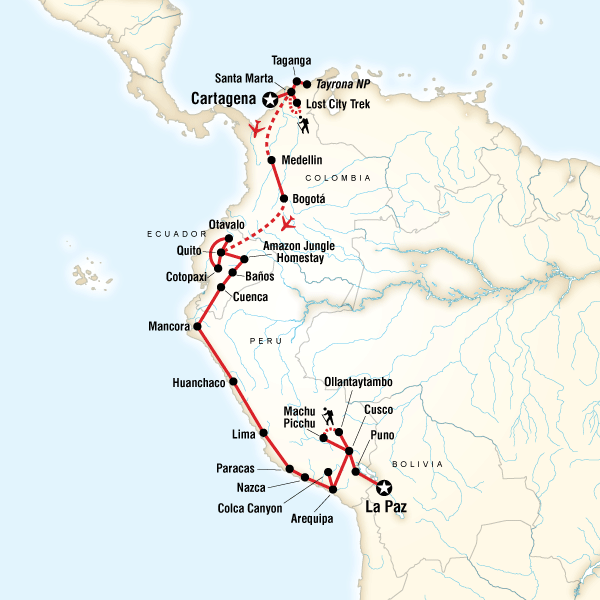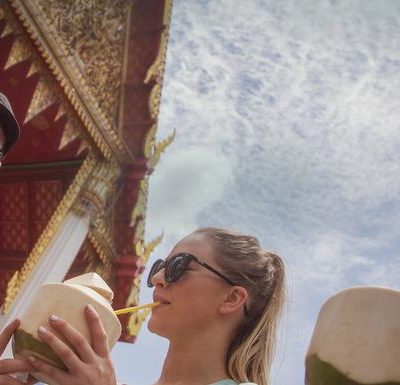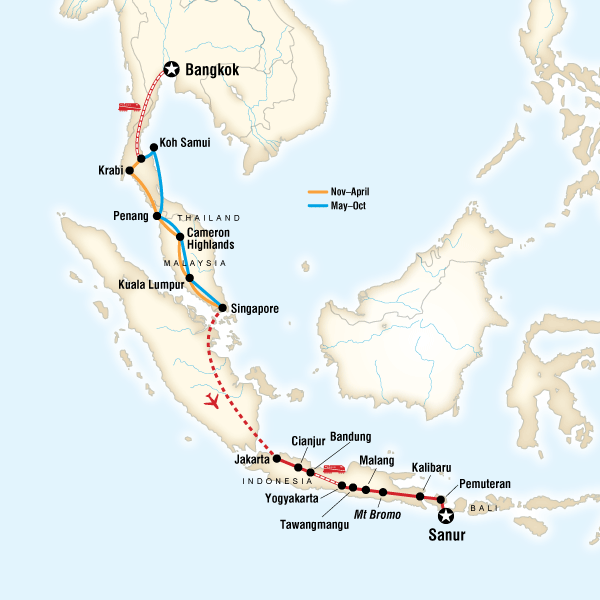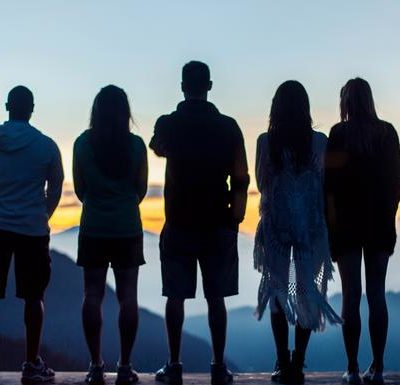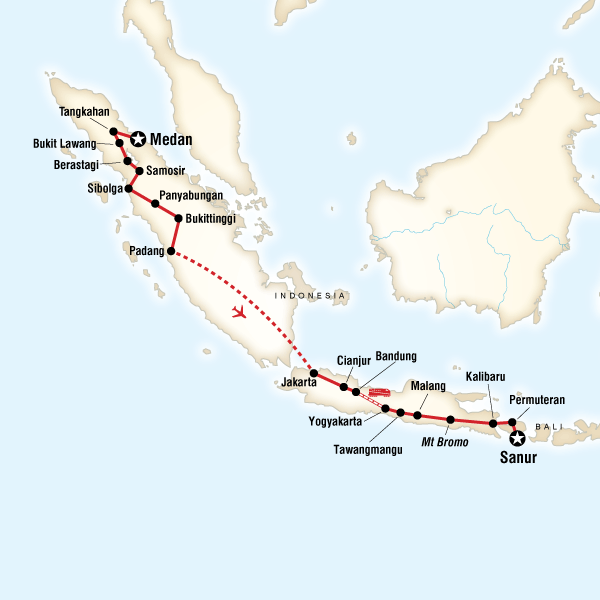More Information
What’s Included
Game drives in Masai Mara Game Reserve, Lake Nakuru National Park, Serengeti National Park and the Ngorongoro Crater. Masai settlement visit and cultural walk. Boat ride on Lake Naivasha. Visit to G Adventures-supported Clean Cookstove project. Guided walk and lunch in a local community. Orientation walk in Stone Town. Free time in Nungwi Beach. Internal flight. All transport between destinations and to/from included activities.
Highlights
Encounter the wildlife of the famous Masai Mara, photograph wildlife at Lake Nakuru National Park, learn from the Masai people in the Loita Hills, track the Big Five across the Serengeti and Ngorongoro Crater, enjoy Zanzibar’s pristine waters, experience the hustle and bustle of Stone Town.
Dossier Disclaimer
The information in this trip details document has been compiled with care and is provided in good faith. However it is subject to change, and does not form part of the contract between the client and the operator. The itinerary featured is correct at time of printing. It may differ slightly to the one in the brochure. Occasionally our itineraries change as we make improvements that stem from past travellers, comments and our own research. Sometimes it can be a small change like adding an extra meal along the itinerary. Sometimes the change may result in us altering the tour for the coming year. Ultimately, our goal is to provide you with the most rewarding experience. Please note that our brochure is usually released in November each year. If you have booked from the previous brochure you may find there have been some changes to the itinerary.
VERY IMPORTANT: Please ensure that you print a final copy of your Trip Details to review a couple of days prior to travel, in case there have been changes that affect your plans.
Itinerary Disclaimer
While it is our intention to adhere to the route described below, there is a certain amount of flexibility built into the itinerary and on occasion it may be necessary, or desirable to make alterations. The itinerary is brief, as we never know exactly where our journey will take us. Due to our style of travel and the regions we visit, travel can be unpredictable. The Trip Details document is a general guide to the tour and region and any mention of specific destinations or wildlife is by no means a guarantee that they will be visited or encountered. Aboard expedition trips visits to research stations depend on final permission.
Additionally, any travel times listed are approximations only and subject to vary due to local circumstances.
Important Notes
• Please note that this tour combines with other G Adventures tours. As such, the staff and some travel companions on your tour may have previously been traveling together with G Adventures, prior to Day 1 of your tour. Likewise, some staff and travel companions may be continuing together on another G Adventures tour, after your trip concludes.
• An essential part of your safari is participation – from putting up your tent (while camping) or packing away in the morning, to helping with meal preparation and cleaning up – it is all part of your adventure and when everyone puts in a little effort the trip will run smoothly. Team spirit is part of the fun! All camping equipment (with the exception of your sleeping bag and pillow) is supplied. We supply dome tents and assembly/disassembly takes only 5 minutes. All tents have built-in insect nets. Mattresses are also available, which are approximately 4cm thick, warm and comfortable.
• Sleeping bags are not available for rent and difficult to purchase locally.
• Depending on the lunar cycle, Ramadan will fall between June 18th to July 17th, 2015. Please note that Ramadan is a month of fasting observed by Muslims throughout the world, during which time the followers of Islam should not eat or drink between sunrise and sunset. In Zanzibar and other Muslim areas in Africa, it is important to note that there may be some limitations to services and disruptions to schedules during Ramadan. Generally our tours still operate effectively during this period and food is available to non-muslims throughout the day. It is important to display increased cultural sensitivity during Ramadan, particularly in Zanzibar. Please wear loose fitting clothes, that cover knees and shoulders, and try to avoid eating, drinking or smoking in public out of respect for those who can’t at that time.
• Migration – Tanzania and Kenya
The Seronera Plains, which lie in the southeast of the National Park and extend into the western Ngorongoro Conservation Area, form the main ungulate calving grounds of the Serengeti. The wildebeest typically disperse into the Seronera plains during the short rains, which fall in late November or early December, before calving in January, and staying put until the end of the long rains from January to early May. Towards the end of April the wildebeest start to congregate on the southern plains in the preparation for the 800km northward migration. The major obstacle faced by the wildebeest on this migration is the crossing for the Grumeti River through the western corridor, which typically occurs from June into early July. From July to October, the ungulates disperse again, with about half of them crossing the Mara River into Kenya’s Masai Mara Game Reserve and the remainder spreading out through the northern and western Serengeti. By late October the animals have generally started to plod back southward to the Seronera Plains, to arrive there in late November when the cycle starts all over again.
• This is not a physically demanding journey; however, travelling can be difficult, as long drives and poor road conditions are the rule as opposed to the exception in both Kenya and Tanzania. A safari is about travelling to see animals, so we cover long distances crossing the country to visit different game parks. Once there, we spend the majority of the time viewing game while driving in the parks. This translates to a lot of driving. Despite this, the diversity and scenery of the African landscape, the local culture and abundant wildlife are all well worth the experience.
• Looking to add to your experience? Check out our Extras! Specially designed for travellers with unique interests, theme packs are optional add-ons to your G adventures trip that make your adventure more you-centric. Theme Packs must be booked prior to departure, please see details in our optional activities field and ask your Sales CEO.
Group Leader Description
On this journey, you will be accompanied on your trip by 2 crew members – a Chief Experience Officer (CEO) and a driver.
The Chief Experience Officer (CEO) will be the group manager and leader. He/she organizes the trip, and will be there to assist you when needed. He/she will take care of the small things so you can concentrate on enjoying your adventure. All of our CEOs in East Africa are experienced group leaders, with a broad knowledge base of the region’s history, cultures, and wildlife. Most of our leaders in the region are from East Africa, though it may be possible that you’ll have a leader from the southern African region.
All of our overland adventure vehicle (OAV) drivers are experienced in the routes travelled, and highly skilled in dealing with different terrains.
We also use local guides for some included activities where we think more specific knowledge will add to the enjoyment of the places we are visiting.
Group Size Notes
Max 22, Avg 20
Meals Included
15 breakfasts, 10 lunches, 10 dinners
Meals
As mentioned above, most of the meals on this tour are included in the tour price. When a meal is not included, this is because there are often many options available – we would like to give you the opportunity to explore a bit and test the local cuisine yourself. In these cases, your CEO will be able to suggest some good local restaurants or options for you to choose from.
All included meals will be prepared from fresh local produce. The majority of the shopping for foodstuffs will be done before the trip departs, and fresh goods, such as meats, fruits, vegetables, and dairy products, will be bought en route during the trip from supermarkets, local shops and markets. Breakfasts will generally consist of breads and cereals, if time allows a warm breakfast may be prepared. Many lunches will be provided en-route and will be light meals such as sandwiches and/or salads. All evening meals will be freshly-prepared hot meals, and will consist of a variety of continental and local dishes.
Your CEO will do all the meal preparation and lead the way here, but will prepare a duty schedule for ensuring a fair, rotating participation from you and your group members in the meal preparation and dish washing duties.
Vegetarian meals and other dietary requirements need to be specified prior to arrival. Please note all bottled drinking water will be at your own expense.
Transport
Overland adventure vehicle (OAV), minivan, plane, 4×4 safari vehicle, shared shuttle
About our Transportation
We use a large 24 seat overland adventure vehicle (OAV) to criss-cross through Kenya. The overland adventure vehicle (OAV) allows the entire group to travel together, and because of its height, is great for game viewing and for enjoying the scenic landscape.
Road conditions can run the full gamut from new to being in very poor condition. This style of travel is by no means luxury as we are traveling in a truck, but it does allow us the flexibility of making stops when needed, and reaching some out-of-the way parts of Africa where the traditional safari crowd would not dare to go.
Here’s a quick look at the well-equipped G Adventures overland adventure vehicle (OAV):
– Storage for main luggage in a compartment under the seating area (accessed from the outside of the truck). Day packs can be stored at your feet (there is plenty of room).
– Onboard safety box(es) for valuables.
– Front view windows
– Large sliding windows, great for game viewing
– Fully equipped retractable kitchen
– Intercom between seating area and driver
– A cd-player with an input for mp3s
– Our overland vehicles are equipped with outlets for your charging convenience. Depending on the vehicle, it will have either South African or East African outlets. We suggest bringing a universal adapter so you are prepared for both
Please note that our trucks do not have on-board bathrooms. Nor do they have seats that recline as often reclining seats will break, and thus you will have some seats that recline and some that don’t.
Solo Travellers
We believe single travellers should not have to pay more to travel so our group trips are designed for shared accommodation and do not involve a single supplement. Single travellers joining group trips are paired in twin or multi-share accommodation with someone of the same sex for the duration of the trip. Some of our Independent trips are designed differently and single travellers on these itineraries must pay the single trip price.
Accommodation
Participation camping (10 nts), simple hotel (5 nt).
My Own Room
Please note that if you have booked the “My Own Room/Tent” option for this tour, you will receive your own single room/tent for all night stops.
About Accommodation
Camping in East Africa is truly an adventure. You will be able to get off the beaten track to get a first-hand experience of the beautiful wilderness and nature. While camping, we stay at designated campsites in national parks and outside towns. Campsite facilities in eastern Africa are generally good, but can be basic in certain places. There are generally small restaurants and/or bars, washing facilities and occasionally telephones available.
The camps have flush toilets, and showers at some camps are outdoors, having simple reed enclosures for privacy. Additionally, warm water is available at most sites, but it is not guaranteed to always be warm when you take your shower; the warm water may be used up others who also use the camp. We usually set-up camp within close proximity to the toilet facilities, though occasionally to reach them you may to walk a short distance.
All camping equipment (with the exception of your sleeping bag and pillow) is supplied, including camp mattresses, which are warm and comfortable. We supply dome tents and assembly/disassembly takes only 5 minutes. They are good quality, durable, industry-standard 2-person safari canvas tents. Please note that most adults will not be able to fully stand up inside the tents, though most travellers find these more than adequate, as they have a base area of approximately 4 square meters. These tents are regularly treated with a waterproofing agent, but under certain rainy conditions, the tent fabric may become saturated to the point where seepage or leakage may occur. All tents have built-in mesh insect netting on the windows and doors.
We travel with our own portable camp chairs with a comfortable back-rest, and we utilize our own cooking equipment to provide the group good quality camp meals.
In camping within the national parks and conservation areas, some camp sites are enclosed for keeping the resident wildlife out. Other camps are open to the natural environment – care must be taken, especially at night, when a torch/flashlight is recommended when walking around the camp area.
Joining Hotel
Hotel Boulevard
Harry Thuku Rd
P.O. Box 42831 – 00100
Nairobi, Kenya
Tel: +254 20 337221, +254 20 227 567/8/9
Fax: +254 20 317 825
Joining Instructions
Please Note:
The Kenya Airports Authority (KAA) will partially close the runway at the Jomo Kenyatta International Airport (NBO) during off-peak for rehabilitation as part of the ongoing expansion and modernization works at the facility. The landing strip will be closed daily between midnight and 6am beginning April 1, 2015 and April 1, 2016.
Passengers are kindly advised to contact their airlines to confirm their flight schedule in advance (particularly if flights have been scheduled to arrive within these times) and please update us with any changes to flight itinerary that may effect arrival transfers.
On arrival in Nairobi, an arrival transfer is not included. Please make your way to the joining hotel. Jomo Kenyatta International Airport is about 20 km from downtown and your hotel. There are a variety of ways to get into the city. An airport taxi is recommended. This can be booked either inside the airport at an ‘information desk’ or outside of the terminal. The price is approximately USD 20.
If you have a pre-booked transfer, please look for the driver, who will be holding a sign with the G Adventures logo and your name on it. He will be in front of INFORMATION DESK just outside the secured baggage retrieval area. At times there are taxi drivers who will want to get your business, so please be aware of them and look for our G Adventures representative.
Please note that day 1 is an arrival day and no activities have been planned, though a welcome meeting will be held in the hotel reception area in evening of day 1. Here you will meet other tour participants and receive information about general and specific aspects of the trip. Upon arrival to the hotel, look for a notice from your CEO with information regarding this group meeting. If you arrive late and miss the meeting, your CEO will leave you a message detailing what time and where you should meet the next morning.
The tour departs Nairobi in the morning of day 2.
Arrival Complications
We don’t expect any problems, and nor should you, but if for any reason you are unable to commence your trip as scheduled, as soon as possible please contact your starting point hotel, requesting that you speak to or leave a message for your CEO (if you are not on a group tour please refer to the emergency contact details provided in this dossier). If you are unable to get in touch with your leader, please refer to our emergency contact details.
We strongly advise you to pre-purchase your entry visa prior to arrival as queuing for the visa at the airport can cause long delays in clearing customs. This is especially relevant if you have pre-booked an airport transfer.
If you have pre-booked an airport transfer, it is necessary to make contact with our representative, who waits with a G Adventures sign outside the secure baggage-retrieval area, within 1.5 hours (90 minutes) of your flight’s scheduled arrival time. No refunds will be granted if you fail to make contact with our representative within this reasonable time. After such time, we recommend that you make your own way to the Starting Point hotel, following the Joining Instructions.
Your arrival transfer has been arranged based on flight information provided to us. If you receive notification of a flight schedule change outside of 48 hours before your flight is scheduled to arrive, please contact us to advise of your new flight details.
Sales offices:
From within Australia – 1-300-796-618
From within Canada or the United States – 1-800-465-6500
From within the UK – 0870 999-0144
From anywhere else – +1-416-260-0999
*Important note* If you are advised of the flight schedule change within 48 hours of your scheduled arrival time, please contact the airport transfer operator listed as the emergency contact for your tour which can be found below. We will do our best to rearrange your arrival transfer however we cannot guarantee this. If your arrival transfer does not arrive within 30 minutes after you have exited the arrivals area please take a taxi to your start point hotel.
Emergency Contact
Should you need to contact us during a situation of dire need, it is best to first call either the G Adventures Local Representative (if one is listed below) or our G Adventures Local Office. If for any reason you do not receive an immediate answer, please leave a detailed message and contact information, so they may return your call and assist you as soon as possible.
AIRPORT TRANSFER: If you have purchased an arrival through G Adventures or if an arrival transfer is included in the cost of your tour, please note that: Your arrival transfer has been arranged based on flight information provided to us. If you are advised of a flight schedule change within 48 hours of your scheduled arrival time, we will do our best to rearrange your arrival transfer however we cannot guarantee this. If your arrival transfer does not arrive within 30 minutes after you have exited the arrivals area please take a taxi to your start point hotel.
For any issues relating to pre-booked transfers for Nairobi Jomo Kenyatta International Airport, including delays or missed transfers, please contact our airport transfer operator:
Patrick: +254 707 889 920 or +254 732 874 566 (from outside of Kenya)
Patrick: 0707 889 920 or 0732 874 566 (from within Kenya)
EMERGENCY CONTACT NUMBERS
G Adventures Local Office (Nairobi, Kenya)
Emergency number:
From outside Kenya: +254 727 208 832
From within Kenya: 0727 208 832
If you are unable for any reason to contact our local operator or local office, please call the numbers listed below, which will connect you directly with our 24 hour Sales team, who will happily assist you.
Toll-free, North America only: 1 888 800 4100
Calls from UK: 0844 272 0000
Calls from Germany: 01805 70 90 30 00
Calls from Australia: 1 300 796 618
Calls from New Zealand: 0800 333 307
Outside North America, Australia, New Zealand, Germany and the UK: +1 416 260 0999
Finishing Point Instructions
Upon arrival to Nairobi in the late afternoon, the Overland adventure vehicle (OAV) will head to the Indaba Camp, via the Hotel Boulevard. Those passengers with post-night accommodation, or who wish to be dropped off, at the Hotel Boulevard will end their tour upon arrival at the hotel. The truck will continue on to the Indaba Camp for those passengers who have post-nights booked there, or wish to stay there after the tour.
Your tour ends at your respective drop off point. There is no included accommodation for this night in Nairobi. You may choose to pre-reserve post-tour accommodation at either finishing location in Nairobi through G Adventures.
What to Take
You will be on the move a lot, so our advice is to pack as lightly as possible. Your baggage should be clearly labelled and restricted to one soft compact suitcase, sports bag, or backpack, no larger than 30cm(height) x 30cm(width) x 60cm(length), maximum 15kg, plus a daypack. Luggage limits on airlines are strictly enforced, and due to limited vehicle capacity, the cost of transporting any luggage beyond these restrictions is the responsibility of the client. Please note, if you are travelling with a large amount of luggage and will be returning to Nairobi later in your trip, you may leave a portion of it at the start hotel, this is indeed possible as storage facilities are available.
For our camping style tours you will need to provide your own sleeping bag, small pillow and sleeping sheet (if you would like). We provide the tent and the sleeping pads.
It is important to pack clothes for warm days and cool evenings, as well as a warm jacket for early morning game drives. Light, quick-drying, practical clothes are advisable for this safari trip. A set of smart casual clothes is also advisable for your time in Nairobi and Arusha.
Checklist
-Documents
-Passport
-Insurance info
-Flight info
-Cash, credit and debit cards
-Vouchers and pre-departure information
-Required visas or vaccination certificates
-Yellow Fever certificate
-Weather-appropriate clothing
-Fleece or wool jumper/jacket
-Windproof/waterproof jacket
-Small towel and swimwear
-4 shirts/t-shirts, cool and breathable
-Long-sleeved shirt or sweater for evenings
-1 pair of shorts
-2 pairs of long trousers
-1 pair hiking pants/track pants
-Comfortable shoes
-Sport sandals
-Sun hat, Bandana
-Sunblock
-Sunglasses
-Watch or alarm clock
-First-aid kit (should contain Lip balm with sunscreen, Aspirin, Ibuprofin , Malaria pills, bandaids/plasters, tape, anti-histamine, Antiseptic cream, Imodium or similar tablets for mild cases of diarrhoea, rehydration powder, insect repellent, extra prescription drugs you may be taking)
-Toiletries (biodegradable)
-Toilet paper
-Day pack
-Camera with extra memory cards and batteries
-Personal Entertainment
-Binoculars
-Waterproof backpack cover
-Flashlight/Torch
-Outlet adapter
-Insect Repellent
-Moneybelt
-Antibacterial wipes/gel
-Reusable water bottle
-Pocketknife
-Water purification tablets or filter (optional)
Laundry
Hand washing of clothes can be done at campsites, as most have simple facilities for this. We recommend you bring a non polluting/biodegradable soap, as well as a roll of simple string to act as a drying line for your clothes. If you arrive in the late afternoon, or if there is poor weather, it may not be possible for your clothes to completely dry. Your start hotel also has laundry service for a fee.
Visas
All countries require travellers to have a valid passport (with a minimum 6 months validity), and you are required to acquire the entry visas for each of the countries visited.
The Kenyan Government has introduced an electronic visa process with effect from July 2nd. Travellers wishing to enter Kenya need to visit www.ecitizen.go.ke and follow instructions for processing their electronic visa in advance of their arrival into Kenya. As this measure was introduced with little advance notice, there is a grace period where travellers may continue to apply upon arrival into Kenya for their visa. You can obtain a visa for US$50. Kenya is now strictly enforcing a “blank pages, condition of entry”. All those requiring a visa on arrival must have at least two blank pages available in their passports. Failure to meet this requirement could mean that entry will be refused.
The border crossing used will be Namanga Border Post.
———
East Africa Tourist Visa
An East Africa Tourist Visa allows the holder to move freely between Kenya, Rwanda and Uganda with only one Visa, and is valid for a period of 90 days. It also acts as a multiple entry Visa, so if you leave any of the above countries, you do not need a new Visa to re-enter (provided it is within the 90 day validity period). These need to be applied for in advance, and you should contact the foreign Embassy (of the country you will be entering through) for more details. The cost is 100USD.
Please see below for more information:
http://www.visiteastafrica.org/visa/
————–
This information is accurate at the time of writing, and please contact your local embassy or consulate for the most up-to-date visa requirements and costs, regarding these, and the other countries visited, or see your travel agent. It is your responsibility to have the correct travel documentation.
Spending Money
Every traveller is different and therefore spending money requirements will vary. Some travellers may drink more than others while other travellers like to purchase more souvenirs than most. Please consider your own spending habits when it comes to allowing for drinks, shopping and tipping. Please also remember the following specific recommendations when planning your trip.
Money Exchange
The local currency in Kenya is the Kenyan Shilling (KES, or KSH) and the local currency in Tanzania is the Tanzanian Shilling (TSH, or TZS).
Shillings can be obtained locally by changing foreign currency or by using ATMs (where available) which will disperse local currency. Your CEO will inform you where you can change money throughout the tour and approximately how much money you will need for each country.
The easiest foreign currency to exchange for locally for any of the local currencies is the $US; however the British Pound and Euro may also be exchanged as well. Please note that due to past problems with forgery, $US notes that are older than year 2006 are not accepted in Africa.
Large note ($US 50, $US 100 etc) can be difficult to change in some places, but will gain you the best exchange rate.
If you plan to rely on cash, please bring foreign currency (Euro, Pound, USD) with you, as it is often expensive to buy these currencies locally. And in more rural areas, it is often not likely.
If you plan to buy your visas at borders, you will need to bring $USD cash to pay for these visas. Please note you cannot use the local currency or any other currency to buy these visas- they must be purchased in USD.
Please do not bring Travellers’ cheques to Africa. They are difficult if not impossible to exchange in many places.
Visa/Plus system cards are the most widely accepted debit cards. it is harder to find machines Mastercard/Cirrus cards. We highly recommend that if you hold a Mastercard, you obtain a Visa card prior to departure and travel with both. This is also useful should something unforeseen happen to one of your cards during your travels.
While there are many ATMs in the major centres, there are no guarantees that your credit or debit cards will actually work in Africa. Check with your bank.
Credit cards can be used in major cities and towns ONLY but please do not rely on them as a method of payment because they are generally not widely accepted. You should be aware that to purchase products or services on a credit card a fee of 5%-10% usually applies. The majority of our optional activities can also be paid by credit card. Your CEO will advise on these.
Please note that in many areas there may be occasional power-outages, where there will be no electricity for hours at a time. In addition, ATMs outside of larger centers often run out of cash or can be out of order unexpectedly. These factors could affect your ability to access money from ATMs. As such, please do not rely on credit or debit cards as your only source of money.
A combination of foreign currency and debit/credit cards for cash advances is best. Always take more rather than less, as you don’t want to spoil the trip by constantly feeling short of funds.
As currency exchange rates can fluctuate often we ask that you refer to the following website for daily exchange rates: www.xe.com.
Emergency Fund
Departure Tax
USD30, usually included in most international air tickets.
Tipping
Tipping is an expected – though not compulsory and optional (up to the discretion of the group/guest) – component of your tour program and an expression of satisfaction with the persons who have assisted you on your tour. It is one of the most direct ways that you can have a positive economic impact within the African community. Although it may not be customary for you, it is of considerable significance to the people who will take care of you during your travels, as an important source of income for those in the tourism industry.
Giving a tip should be seen as a formal ‘thank you’, and the action should in no way be awkward. The best method of tipping someone that has served the whole group is to plan in advance, and not rush when it comes to saying goodbye. A suggestion would be for each group member to contribute anonymously by putting their tip into an envelope. This often works the best and the group as a whole should gather to present the gift to the recipient(s), offering their thanks and showing their appreciation. This method brings the action out into the open, allowing for a friendly and appreciative interaction between the group and the recipient(s).
You may use the following as a guideline, all given in a per client format: Restaurant/Café servers: 10% of cost of bill, especially when in a large group (no envelope required); Driver / CEO US$3/4 each, per day worked. While on safari in Tanzania: Certified Safari Guide/Driver: US$3-5 (full day); Supply Driver US$2-3 (full day).
Optional Activities
Optional activity prices are subject to change and can fluctuate in relation to the high/low season and the number of people on a specific excursion. Not all excursions listed here may be available, due to season, or weather conditions. As generally not a lot of time is spent in start/end cities, you may want to arrange to arrive early, or stay longer after the trip in order to allow sufficient time to participate in optional activities there.
All prices are in US dollar amounts, per person but will generally be paid in local currency.
Nairobi
Bomas of Kenya 10 USD
Giraffe Centre 12 USD
Karen Blixen Museum 15 USD
Nairobi National park 50 USD
Safari Walk orphanage 25 USD
Animal Orphanage 25 USD
National museum 14 USD
Railway Museum 5 USD
National Archives F.O.C.
The Carnivore Restaurant $35 set meal
Elephant orphanage 6 USD (only open from 11am-noon daily, approx. 30 mins from hotel)
Nungwi Beach
Snorkelling 50 USD
North Coast Tour 75 USD (add $10 single supplement)
Sailing Trip 75 USD (add $10 single supplement)
Safari Blue Dhow Adventure 85 USD (add $25 single supplement)
Serengeti
Hot Air Balloon Ride – $539 pp
Please note transport to/from activities is not included.
Please note, the optional Masai village visited in the Masai Mara is not to everyone’s taste. The Masai have been known to use aggressive sales techniques to pressure tourists into buying trinkets. G Adventures does not endorse this activity as we feel this experience does not represent an authentic village, nor do we feel that the entrance fee represents good value. Proceed with caution!
Health
Please note inoculations may be required for the country visited. It is your responsibility to consult with your travel doctor for up to date medical travel information well before departure.
We recommend you contact your family physician, or your local travel clinic for the most up-to-date health information at least one month before departure.
Please ensure you have all the inoculations recommended by your doctor for travel in East Africa. Be aware that Kenya has many regions where malaria is present. We thus recommend that you take malaria medication; your doctor should be able to recommend the necessary prophylactics. Travellers should also carry a basic travel first-aid kit and hand sanitizers / antibacterial wipes as medical facilities are basic throughout these countries. An important item to include is a liquid or gel hand sanitizer and/or alcoholic/sanitary wipes, as they will aid in personal cleanliness and hygiene throughout the trip. The local tap water should not be consumed, so any water treatment tablets (ex. iodine), drops, etc, would help, but good, clean, and inexpensive bottled water is widely available throughout the entire trip. If you have any pre-existing medical condition, you must inform G Adventures prior to the purchase of the tour, and upon arrival, to the CEO so he/she can be prepared to help you.
East African trypanosomiasis (sleeping sickness):
This is a serious parasitic disease that is always fatal without treatment. The disease is spread by the bite of tsetse flies, found only in parts of Eastern and Central Africa, including Uganda, Kenya, Tanzania. There is no vaccine or drug to prevent African trypanosomiasis.
Sand flies and Mosquitos:
Are found in the areas visited. Mosquitos are more prevalent in areas that receive more rainfall, and sand flies, though generally found on the coast, can also be found in dry & dusty conditions inland. Both tend to come out in the early evening and early mornings.
Malaria:
This infectious disease is transmitted by mosquitos carrying the parasite. These mosquitos are found at altitudes of under 1,800m, and thus can be found in most areas that we visit on this tour. You must have prophylactics which you can obtain from your local doctor at or health clinic.
Precautions against insect bites:
* Wear protective clothing, including long-sleeved shirts and pants at all times.
* Wear khaki or olive-colored clothing. Tsetse flies are attracted to bright and dark colors.
* Use bed nets.
* Inspect vehicles for tsetse flies before entering.
* Avoid bushes. Tsetse flies are less active during the hottest part of the day; they rest in bushes and will bite if disturbed.
* Use insect repellent. Although repellents have not proven effective in preventing tsetse fly bites, they are effective in preventing other insects from biting and causing illness.
Sun:
It is very important that you wear sun block, even on a cloudy day when it feels cool as we are near the equator and the sun is very strong. A sunburn can turn a pleasant trip into a painful trip.
Hydration
Even when days are cool please be sure to drink a minimum of two litres of water and refrain from drinking to many diuretics, as while when travelling outdoors the breeze can dehydrate you quickly as well as the heat.
Diarrhoea:
It is normal for people travelling overseas to get an upset stomach due to a change of climate and food. Please make sure that you wash your hands and stay away from street food.
Safety and Security
Many national governments provide a regularly updated advice service on safety issues involved with international travel. We recommend that you check your government’s advice for their latest travel information before departure. We strongly recommend the use of a neck wallet or money belt while travelling, for the safe keeping of your passport, air tickets, travellers’ cheques, cash and other valuable items. Leave your valuable jewellery at home – you won’t need it while travelling. Many of the hotels we use have safety deposit boxes, which is the most secure way of storing your valuables. A lock is recommended for securing your luggage. When travelling on a group trip, please note that your CEO has the authority to amend or cancel any part of the trip itinerary if it is deemed necessary due to safety concerns. Your CEO will accompany you on all included activities. During your trip you will have some free time to pursue your own interests, relax and take it easy or explore at your leisure. While your CEO will assist you with options available in a given location please note that any optional activities you undertake are not part of your itinerary, and we offer no representations about the safety of the activity or the standard of the operators running them. Please use your own good judgment when selecting an activity in your free time. Although the cities visited on tour are generally safe during the day, there can be risks to wandering throughout any major city at night. It is our recommendation to stay in small groups and to take taxis to and from restaurants, or during night time excursions.
Protests and Demonstrations- Protests and demonstrations, even those that are well intended, have the potential to turn violent with no warning. Counter protests can also turn violent. Action by security forces to disperse demonstrators and protesters may occur at any time. If you are in an area where demonstrators or protesters are gathering, avoid the temptation of staying for a good photo opportunity and leave the area immediately.
Water based activities have an element of danger and excitement built into them. We recommend only participating in water based activities when accompanied by a guide(s). We make every reasonable effort to ensure the fun and adventurous element of any water based activities (in countries with varying degrees of operating standards) have a balanced approach to safety. It is our policy not to allow our CEOs to make arrangements on your behalf for water based activities that are not accompanied by guide(s).
Swimming, including snorkeling, is always at your own risk.
We take all prudent measures in relation to your safety. For ways to further enhance your personal safety while traveling, please visit:
www.gadventures.com/travel-resources/safety/
Trip Specific Safety
Nairobi
-Always leave your passport (It’s better to carry a photocopy of it instead), traveller’s cheques, flight tickets and money that you won’t be using in the safe deposit in your hotel room/reception. This is free of charge to G Adventures Adventure clients.
-Remember that like in any other city, you should never leave your bags unattended, nor flaunt jewellery, cameras etc
-Please don’t wander through the city at night. Stick to the main streets only during the day, and after sundown, please take a taxi. Taxis can be organised from reception of your hotel. Also, take the address of the hotel with you.
-People are generally friendly, but don’t let people take advantage of you, especially the sales people!
-Beware of people approaching you on the street with an apparent interest of where you are from, and want to sit down and have a chat with you. These people are most likely con men and try to get money from you in one way or another
-People on the street who ask you if you want a safari and have a brochure are often con men, best to avoid these folk. Besides, you’re already on safari!
Photography
Please refrain from taking photos of police stations, airports, bus stations, immigration are border crossings, army barracks and personnel, or any government building. It is against the law and will result in the minimum of your film and camera being confiscated.
Medical Form
Our small group adventures bring together people of all ages. It is very important you are aware that, as a minimum, an average level of fitness and mobility’ is required to undertake our easiest programs. Travellers must be able to walk without the aid of another person, climb 3-4 flights of stairs, step on and off small boats, and carry their own luggage at a minimum. Travellers with a pre-existing medical condition are required to complete a short medical questionnaire, which must be signed by their physician. This is to ensure that travellers have the necessary fitness and mobility to comfortably complete their chosen trip. While our CEOs work hard to ensure that all our travellers are catered for equally, it is not their responsibility to help individuals who cannot complete the day’s activities unaided. Please refer to the physical ratings in this Trip Details document for more information.
The medical questionnaire can be found online at:
www.gadventures.com/medical-form.
A Couple of Rules
Illegal drugs will not be tolerated on any trips. Possessing or using drugs not only contravenes the laws of the land but also puts the rest of the group at risk. Smoking marijuana and opium is a part of local culture in some parts of the world but is not acceptable for our travellers. Our philosophy of travel is one of respect towards everyone we encounter, and in particular the local people who make the world the special place it is. The exploitation of prostitutes is completely contrary to this philosophy. Our CEOs have the right to expel any member of the group if drugs are found in their possession or if they use prostitutes.
Travel Insurance
Travel Insurance: Travel insurance is compulsory in order to participate on any of our trips. When travelling on a group trip, you will not be permitted to join the group until evidence of travel insurance has been sighted by your CEO, who will take note of your insurance details. When selecting a travel insurance policy please bear in mind that all clients must have medical coverage and that we require a minimum coverage of USD 200,000 for repatriation and emergency rescue. We strongly recommend that the policy also covers personal liability, cancellation, curtailment and loss of luggage and personal effects. If you have credit card insurance we require proof of purchase of the trip (a receipt of credit card statement) with a credit card in your name. Contact your bank for details of their participating insurer, the level of coverage and emergency contact telephone number.
Planeterra-The G Adventures Foundation
Through our commitment to responsible tourism we have developed the Planeterra Foundation, a non-profit organization dedicated to making a positive difference in the lives of people and communities around the world through support of international charities, local organizations and community projects in the places that we visit on our tours. G Adventures matches all individual donations and pays all administration costs, which means that 100% of each donation is doubled and goes directly to support our projects. For more information about Planeterra and the projects we support, or to make a donation, please visit www.planeterra.org
Planeterra Dollar-A-Day Program
Our Dollar-A-Day Program provides travellers with the opportunity to help us give back to the people and places visited on our tours by donating one dollar per day for the duration of their tour. 100% of these proceeds will go directly to support our G Adventures for Good projects.
To participate in this program please indicate at the time of booking that you would like to participate in G Adventures’ Dollar-A-Day program, either by clicking the check box online, or by advising your G Adventures specialist or travel agent. (Note: Donation will be charged in the currency of your booking)
Feedback
Newsletter
Travel Forum – The Watering Hole
Be sure to stop by The Watering Hole, our adventure travel forum. If you’re interested in meeting others booked on your upcoming trip, check out the Departure Lounge section of our forum and introduce yourself. Otherwise, just drop in at anytime to share some travel tips, ask questions, meet other travellers and quench your thirst for travel. Our forum is located at wateringhole.gadventures.com.
Max Pax
22
Group Leader
2 Chief Experience Officers (CEOs) as head guide/cook and driver on safari, local guides. 1 CEO on transfer from Nairobi to Arusha and on Zanzibar.
Day 8 Optional Activities
- Mto wa Mbu Village Cycling Tour -
Day 10 Optional Activities
- Serengeti Balloon Safari -
Day 13 Optional Activities
- Optional Welcome Meeting for Travellers on Combos -
Day 14 Optional Activities
Day 15 Optional Activities
Day 8 Optional Activities
- Mto wa Mbu Village Cycling Tour -
Day 10 Optional Activities
- Serengeti Balloon Safari -
Day 13 Optional Activities
- Optional Welcome Meeting for Travellers on Combos -
Day 14 Optional Activities
Day 15 Optional Activities
